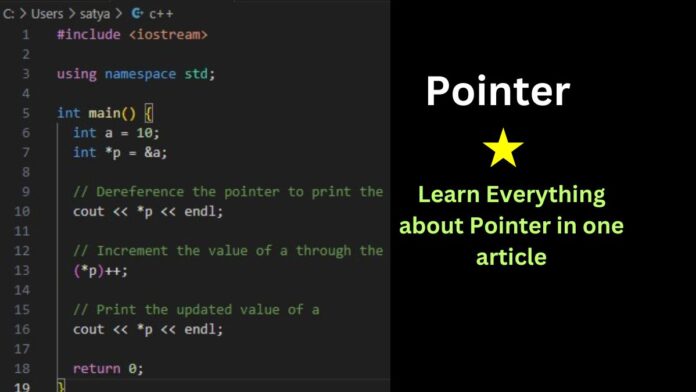Pointers are a fundamental concept in many programming languages, such as C, C++, Java, and Python. They allow programmers to directly access memory locations, which can be used for a variety of purposes, such as improving performance, writing more efficient code, and implementing data structures.
In this article, we will discuss what are pointers, why it is important, when to use pointers in programming, benefits of using pointers, what does a pointer store, how to declare and use pointers and finally explore some examples of how to use pointers in different programming languages i.e. C, C++, Java and Python programming.
What are pointers?
A pointer is a variable that stores the address of another variable. This means that when you dereference a pointer, you are accessing the value of the variable that it points to.
Why are pointers important?
Pointers are important because they allow programmers to directly manipulate memory. This can be used for a variety of purposes, such as:
- Improving performance: Pointers can be used to avoid unnecessary copies of data, which can improve the performance of your code.
- Writing more efficient code: Pointers can be used to implement data structures and algorithms in a more efficient way.
- Implementing data structures: Many data structures, such as linked lists and binary trees, are implemented using pointers.
When to use pointers?
Pointers should be used when you need to directly access memory or manipulate data structures. For example, you might use pointers:
- To implement a linked list or binary tree.
- To pass a variable to a function by reference.
- To dynamically allocate memory.
- To access the memory of a device, such as a graphics card or network card.
Benefits of using pointers
There are several benefits to using pointers, including:
- Improved performance: Pointers can be used to avoid unnecessary copies of data, which can improve the performance of your code.
- More efficient code: Pointers can be used to implement data structures and algorithms in a more efficient way.
- Flexibility: Pointers can be used to access and manipulate data in a variety of ways.
What does a pointer store?
A pointer stores the address of another variable. The address of a variable is the unique identifier of the variable in memory.
How to declare and use pointers?
To declare a pointer, you use the following syntax:
<type> *<variable_name>;The <type> is the type of the variable that the pointer will point to. The <variable_name> is the name of the pointer variable.
For example, the following code declares a pointer to an integer variable:
int *p;
To initialize a pointer, you can use the ‘&’ operator to get the address of another variable. For example, the following code initializes the pointer ‘p’ to point to the integer variable ‘a’:
int a = 10;
p = &a;
To dereference a pointer, you use the ‘*’ operator. For example, the following code prints the value of the integer variable ‘a’ to the console:
printf("%d\n", *p);
Examples of using pointers in difference programming languages
Here are some examples of how to use pointers in different programming languages:
C Programming:
int main() {
int a = 10;
int *p = &a;
// Dereference the pointer to print the value of a
printf("%d\n", *p);
// Increment the value of a through the pointer
(*p)++;
// Print the updated value of a
printf("%d\n", *p);
return 0;
}
Output:
10
11C++ Programming:
#include <iostream>
using namespace std;
int main() {
int a = 10;
int *p = &a;
// Dereference the pointer to print the value of a
cout << *p << endl;
// Increment the value of a through the pointer
(*p)++;
// Print the updated value of a
cout << *p << endl;
return 0;
}
Output:
10
11Java Programming:
public class Main {
public static void main(String[] args) {
int a = 10;
int *p = new int(a);
// Dereference the pointer to print the value of a
System.out.println(*p);
// Increment the value of a through the pointer
(*p)++;
// Print the updated value of a
System.out.println(*p);
}
}
Output:
10
11Python Programming:
def swap(p1, p2):
temp = *p1
*p1 = *p2
*p2 = temp
# Create two integer variables
a = 10
b = 20
# Swap the values of the variables using the `swap()` function
swap(a, b)
# Print the values of the variables
print(a)
print(b)
Output:
20
10Tips for using pointers effectively
Here are some tips for using pointers effectively:
- Always check to make sure that a pointer is initialized before dereferencing it.
- Avoid using null pointers.
- Use the free() or delete function to free any dynamically allocated memory when you are finished using it.
- Be careful when passing pointers to functions. Make sure that the function expects a pointer as an argument and that the function will not modify the pointer itself.
Best resources for learning more about pointers
Here are some of the best resources for learning more about pointers:
- C Pointers Tutorial: https://www.tutorialspoint.com/cprogramming/c_pointers.htm
- C++ Pointers Tutorial: https://cplusplus.com/doc/tutorial/pointers/
- Java Pointers Tutorial: https://www.javatpoint.com/q/10528/pointer-in-java
- Python Pointers Tutorial: https://pencilprogrammer.com/python-tutorials/pointers-explained/
- Effective Java, 3rd Edition: https://www.oreilly.com/library/view/effective-java-3rd/9780134686097/
Conclusion
Pointers are a powerful tool that can be used to improve the performance and efficiency of your code. However, it is important to use pointers carefully, as they can be dangerous if used incorrectly.
Also Read:
